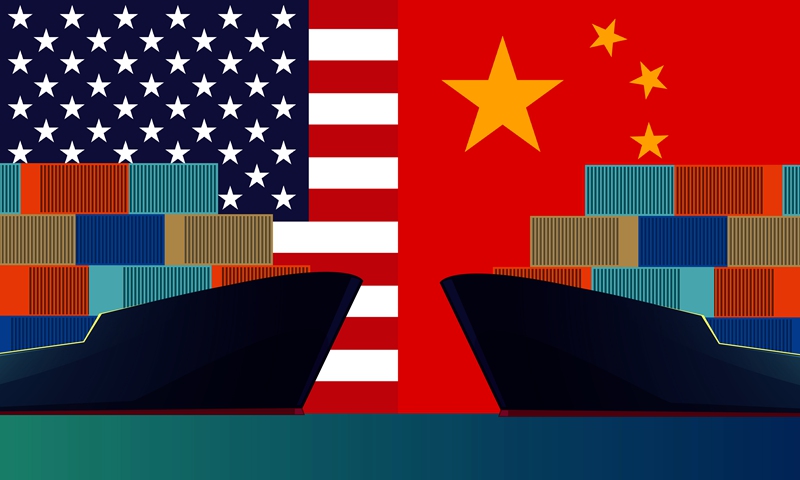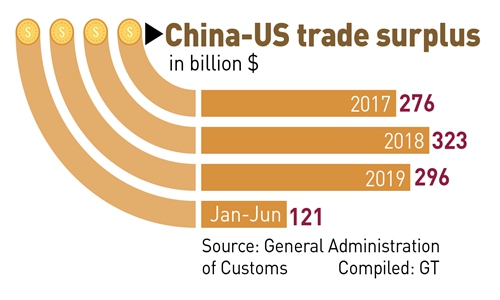Trump’s cards ‘limited’ in trade conflict
By Wang Cong Source: Global Times Published: 2020/9/2 19:10:25
Tariff war with China cost US firms heavily, failed to reduce gap

China US Photo:Global Times

Graphics: GT
During a campaign rally in May 2016, then US presidential candidate Donald Trump accused China of "raping" the US in trade and claimed the US "has the cards" to deal with China. After a costly tariff war and relentless crackdowns on Chinese tech firms during his first term, Trump appears to be shifting gear in his assaults on China - from trade to the South China Sea to Hong Kong to the island of Taiwan - as he seeks reelection in November.
The unmistakable driver behind the shift is the reality that it is very hard to win a tariff war against an important trade partner - nobody wins a war without damage to itself as Chinese officials insisted from the start - despite his administration's ill-advised move to stir up economic tensions with China, trade specialists noted.
Recent developments have underscored that reality. Despite Trump's tough rhetoric against China, he has been noticeably silent on his tariff war or US' trade deficit with China, in stark contrast to his first presidential campaign. The US government has said that it is committed to implementing the phase one trade deal signed between the two countries.
The office of the US Trade Representative on Tuesday extended tariff exemptions for a long list of Chinese-made products, including smart watches, medical masks and respirators, through the end of the year. The move is part of the China-US phase one trade agreement, under which the US agreed to roll back tariffs, but it also shows that the US is still committed to the agreement, despite Trump's changing tone toward the deal, experts said.
The phase one agreement was the most important deal between China and the US during Trump's first term, and it was the result of Trump's tariff war that he claims was intended in part to address his country's trade deficit.
"The US trade deficit with China may have come down a little, but the price was very high for the US," He Weiwen, a former senior trade official and an executive council member of the China Society for World Trade Organization Studies, told the Global Times on Wednesday.
The US trade deficit with China - a focal point of Trump's attack on China in 2016 - only dropped by $2 billion from 2016 to $345 billion in 2019, even as Trump launched a massive tariff war to address it, according to US data.
Trump's tariffs cost US businesses $3.4 billion in June alone, according to US trade group Tariffs Hurt the Heartland. Some estimates said that US tariffs had cost US firms as much as $46 billion as of January.
"For the purpose of his reelection, [the trade card] is no longer sufficient. That's why Trump will continue to crack down on China," He said, pointing to the US' recent attacks on China in technology, educational and diplomatic fields.
However, Trump's latest move - an attempt to force the sale of Chinese video-sharing platform TikTok to a US business - has run into some countermoves by China.
Following Trump's executive orders to force the sale of TikTok to a US business by September 15, China on Friday revised its regulations on tech exports to ban the sale of certain artificial intelligence technologies - like the one behind TikTok's crucial algorithm - to foreign businesses without a permit, effectively erecting a protective wall around the Chinese app's core assets.
Though Trump said on Tuesday that his deadline for the forced sale of TikTok stands and the US government still wants a share of the transaction, experts said that the deal could be pushed back to way beyond the US elections in November. That sets up a tough decision for Trump, as banning TikTok could face a backlash from the app's 100 million mostly young users in the US.
Still, TikTok faces an existential risk in the US market because of Trump's highly manipulative executive orders on normal businesses operations, but the US' long-cherished values of the free market are also on the line, according to Li Yong, deputy chairman of the Expert Committee of the China Association of International Trade.
"The question is whether the US still has a free market. Today, we can't see any evidence of a free market and free investment… what the US is doing is authoritarianism that makes a mockery of US democracy," Li told the Global Times on Wednesday, warning that Trump could rack up attacks and crackdowns against China in areas such as technology.
Posted in: ECONOMY